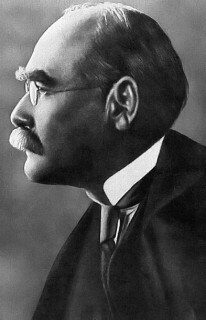
Rudyard Kipling (December 30, 1865 – January 18, 1936) was a British writer who spent part of his life in India. He wrote many books and poems, some of which are still very popular today. Later in his life, Kipling was the first English writer to be given the Nobel Prize for Literature.
Some of Kipling’s most famous writings were about the experience of war. In his poem “Boots,” Kipling uses the same words repeatedly in a rhythm that sounds like soldiers marching. Try reading the first three lines of the poem out loud to hear the rhythm for yourself:
We’re foot—slog—slog—slog—sloggin’ over Africa—
Foot—foot—foot—foot—sloggin’ over Africa—
(Boots—boots—boots—boots—movin’ up an’ down again!)
Kipling also wrote several important books for children. You have probably seen the animated movie “The Jungle Book,” which was based on a set of stories that Kipling wrote about a boy named Mowgli who lived in the jungle. Another one of Kipling’s books for children was called “Just So Stories.” These stories, which Kipling wrote for his young daughter Josephine, describe imaginative ways that animals ended up with their physical qualities. Kipling uses funny rhymes and even made-up words to describe each animal. Here is a short excerpt from a story in this book called “How the Camel Got His Hump”:
THE Camel’s hump is an ugly lump
Which well you may see at the Zoo;
But uglier yet is the hump we get
From having too little to do.Kiddies and grown-ups too-oo-oo,
If we haven’t enough to do-oo-oo,
We get the hump-
Cameelious hump-
The hump that is black and blue!We climb out of bed with a frouzly head,
And a snarly-yarly voice.
We shiver and scowl and we grunt and we growl
At our bath and our boots and our toys…





